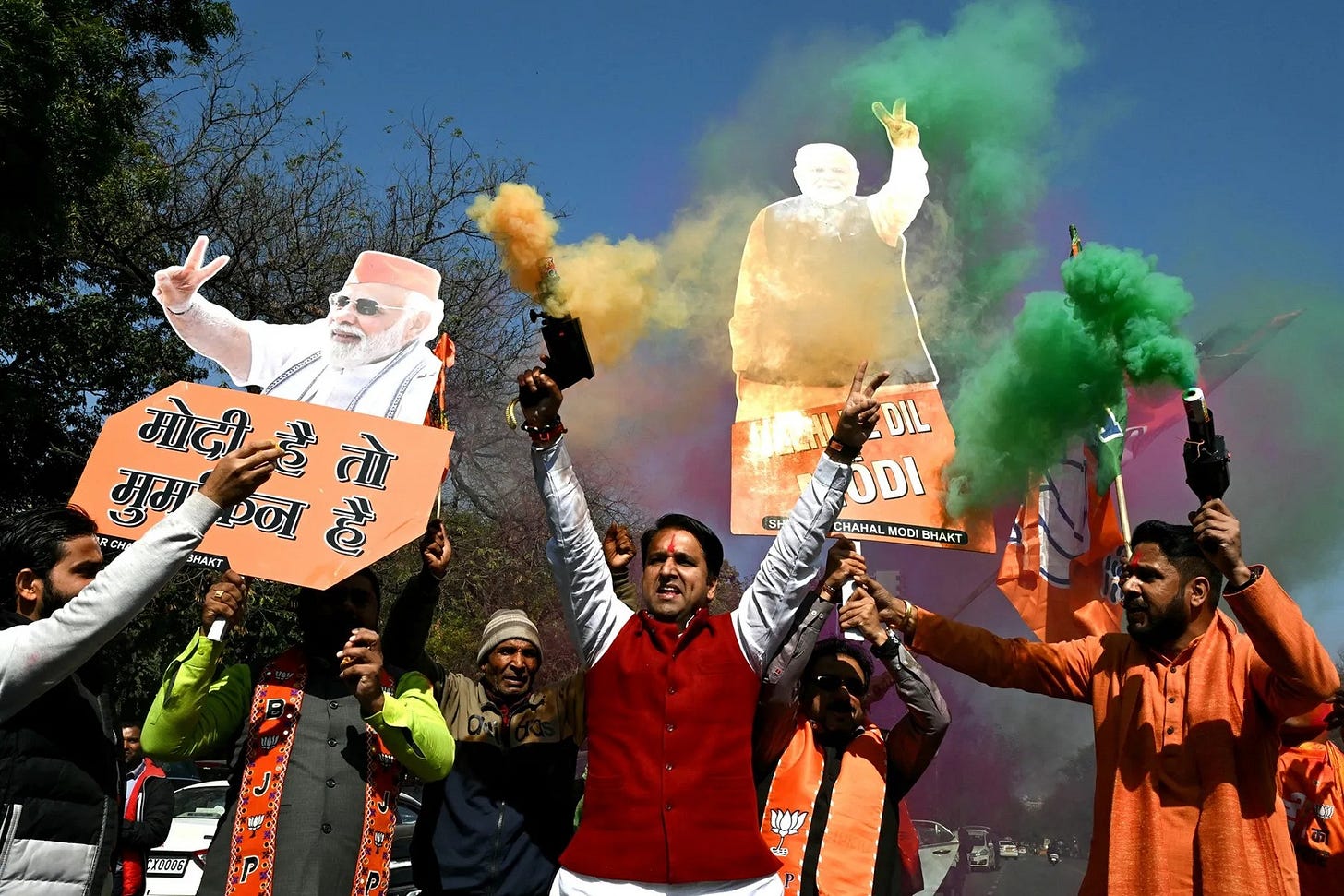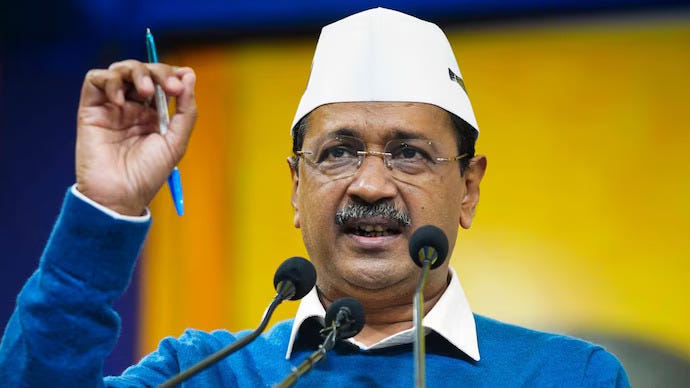Modi's BJP Gains Control of Delhi After 27-Year Gap
Boost for prime minister after last year’s poor general election result
By: John Elliott
Narendra Modi’s political position as India’s prime minister received a significant boost yesterday (February 9) when his Bharatiya Janata Party won a resounding victory in polls for Delhi’s state assembly. It is the BJP’s third state assembly election victory since last April’s general election, which forced the party into an active coalition with smaller parties. That was a serious personal setback for Modi and led to rumblings about his future, especially since he will be 75 in September, the assumed retiring age for BJP officials.
Unexpected BJP election victories last October in the Haryana and Maharashtra state assembly restored much of Modi’s authority, which is now strengthened by the party winning power in the city for the first time since 1998.
The result is also significant because it punctures the national ambitions of the populist Aam Aadmi Party (AAP) that won in 2014 and 2019 on a promise to reform the traffic-choked, smog-ridden conurbation of 33 million people. And it is another dismal failure for the India National Congress whose leader, Rahul Gandhi, has failed to capitalize on gains made in the general election and emerge as a viable top politician.
The BJP won 48 seats in the 70-seat Delhi assembly, while the AAP won 22, down 40 from its 2019 score. The Congress failed to win any seats for the third time, although having earlier ruled the city from 1998 to 2014. This will lead to grumbles about the Gandhi family dynasty’s leadership, but there is no prospect of any change.
There was little difference in the vote share, however with the BJP winning 45.56 percent to the AAP’s 43.57 percent. Congress is now being attacked by opposition parties, which united in last year’s general election, for refusing to link up with the AAP. That split the anti-BJP vote, but Congress leaders say that they didn’t trust the AAP to be a reliable and honest ally. Unity might have made a difference to the result in 13 seats where Congress won more votes than the BJP’s majority, which could have been enough to lead to a hung assembly.
The AAP grew out of a nationwide anti-corruption movement in 2011. Arvind Kejriwal, one of the leaders, broke away to enter active politics and led the party to its 2014 Delhi victory as the chief minister, shocking and infuriating Modi, who had expected to win Delhi less than a year after he had swept to power nationally.
Since then, the Modi government has relentlessly taken measures to undermine Kejriwal, whose powers have been restricted because Delhi is a union territory, not a full state. This means that the chief minister shares power with a lieutenant governor who is appointed, not elected, and constitutionally takes his orders from the home minister – currently Amit Shah, Modi’s closest ally.
One of the issues that swayed some Delhi voters was the way this political rivalry and administrative conflict harmed the city’s development and governance. The AAP had a good record on public health, education, and infrastructure, but the central government runs policing and land. The lieutenant governor has also undermined the general operations of the government.
National Capital Region
Presumably, Modi and Shah will now ensure that Delhi is run constructively on all fronts for the first time in 10 years. Modi said yesterday that the BJP would “make Delhi a modern city.” Pointing out that the BJP is now in power in all of the National Capital Region, which includes the states of Rajasthan, Uttar Pradesh, and Haryana, he said the governments would “focus on mobility and offer the youth new avenues for development”.
The election campaign was notable for the mass of “freebies” offered by all three political parties ranging from the BJP’s gas cylinders, financial assistance during pregnancy, and increased pensions, to the AAP’s free student bus travel, free health care for the elderly and financial aid for priests.
Ironically, since it grew out of an anti-corruption movement, the AAP has been riddled with allegations of widespread bribes and extortion on liquor procurement and licenses. That led Kejriwal and his highly competent deputy, Manish Sisodia, to spend time in jail pending investigations. Both men lost their seats in the election, though by small margins that might have been reversed with Congress support.
More important for middle-class voters, who make up a significant part of the population, were prices and taxation. Fortuitously, the annual budget that was announced on February 1 introduced tax breaks for middle-income earners and small and medium-sized businesses, just four days before voting on February 5.
Election rules
That arguably breached Election Commission rules that there should be no government announcements that could swing votes, yet the commission fixed the date of the polls and knew that February 1 is the traditional date for the budget. (The Reserve Bank of India has just cut interest rates to boost growth, but that was on February 7, two days after the voting.)
The result raises questions about the future of the AAP, which has ambitions to be seen as a potential national party. It won power in Punjab with a resounding victory in 2022 and needs to win there again in 2027 to bolster its position after the Delhi loss.
For Kejriwal, the overall result and loss of his seat is a personal blow. He was seen when he came to power as a new-style politician with no political baggage, a professional background (qualified mechanical engineer), and civil servant as well as a campaigner. That made his emergence a danger for both Congress and the BJP, but his reputation as a credible leader has declined, worsened by the corruption allegations.
The AAP has been increasingly seen as a nationalist party without the BJP’s dominant Hindutva overlay and standing for what some have called progressive patriotism. That made it a special threat to the BJP, which gains backing for its Hindutva policy from a growing nationalist mood as modern India produces new generations of aspirational middle-class consumers.
Both party political and personal prime ministerial reasons, Modi now needs to show Delhi voters – as well as those across the country – that he can deliver on economic growth, inflation, and jobs. That is a tough challenge.
John Elliott is Asia Sentinel’s South Asia correspondent. He blogs at Riding the Elephant.





Modi: India's slightly less insane Trump 🤡💩